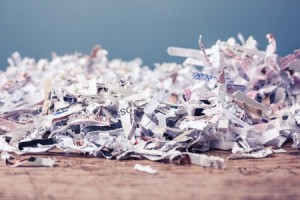To throw or to shred
 Every day your mail box has bills and junk mail. You collect receipts as you make purchases throughout the day. What do you do with pieces of paper you don’t need to keep for tax or personal reasons?
Every day your mail box has bills and junk mail. You collect receipts as you make purchases throughout the day. What do you do with pieces of paper you don’t need to keep for tax or personal reasons?
Some pieces should be shredded. Some should be simply thrown away. But how do you know the difference? Here are some tips to help you through this process.
Throw out any receipts that don’t include personal information. This includes cash purchases. Be aware, however, that even your grocery store rewards number on the receipt could give access to personal information through a customer number.
Shred any document that has any personal account information on it. This includes credit or debit card information, banking information, customer account numbers for stores, or your Social Security number. If you have a copy of any document or receipt with your signature, that should also be shredded. The only exception would be if the last four digits of any of these numbers are the only things on the receipt. Those can be thrown out.
If your name or address is on a receipt or document – and only your name and address – you don’t need to shred it. This information is usually in the public domain already so it would be accessible through other sources such as printed or online phone directories.
Shred any credit card offers, bills, voided checks, pays stubs, renewals on insurance paperwork or anything else you don’t want in someone’s hands. Just make sure you aren’t shredding something you need to keep for tax purposes or for long-term importance, such as current insurance, passports, or licenses.
If you don’t have access to a shredder and want to get rid of any of these pieces – such as while on vacation or cleaning out your purse or wallet – simply tear them up into the tiniest pieces you can. The best option is a cross-cut shredder that will shred in more than one direction. The goal is to prevent anyone from piecing the paper back together for information that can be stolen and sold to other crooks.






